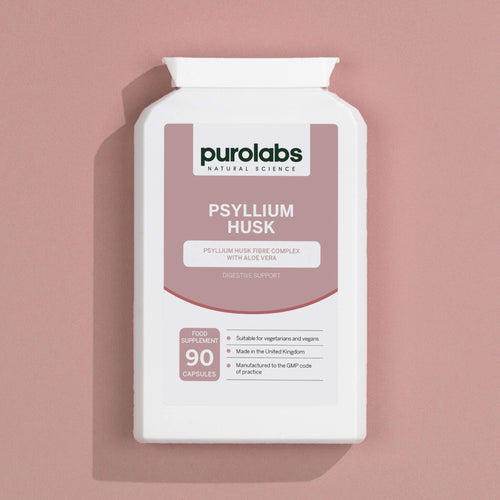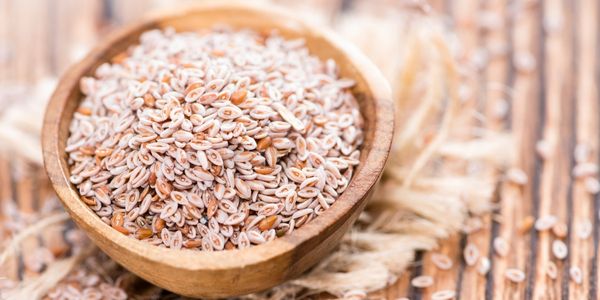If you have or are currently suffering with chronic constipation, then you’ll know psyllium husk all too well.
Perhaps you’ve given it an intriguing glance or two across the counter, wondering to yourself if this is the answer to your gut woes?
Psyllium husk is a type of fibre. It is universally agreed that fibre is vital to healthy gut function and helps to:
- Draws water into the bowels to ‘Bulk’ out stools
- Feeds our microbiome which helps our body to absorb and metabolise nutrients
- Increases satiety and helps with weight management
- Reduces diabetes risk
- Has cardioprotective benefits
Fibre is found in plant foods. Other high fibre foods are1:
- Oats
- Barley
- Legumes
- Peas
- Apples
- Citrus fruits
Psyllium is derived from the Plantago ovata plant. This medicinal plant is native to, and mostly grown, in India, however you can find it worldwide. It makes up the bulk (excuse the pun) of most popular laxative supplements on the market today2.
A fun fact for you: Psyllium isn’t just known for its stool-forming capabilities, it also makes a great stool softening alternative to eggs when baking.
You can also find our popular psyllium husk supplement, along with raving reviews of the product here.

Psyllium Husk
In this article I’m going to delve into what makes psyllium a god send for many, and a bit of a pain in the bum for some (ok no more puns).
Read on to learn more…
Constipation Relief
Psyllium husk is a soluble fibre, meaning that it’s viscous in form, allowing for it to bind with other foods in the gut to form a gel.
This process brings a number of gut-boosting benefits with it including increasing the speed of digestion, and adding moisture to the stool to help it ‘glide’ better through the digestive tract to be excreted3.
A study found that psyllium husk has also been shown to positively affect microbiome health by feeding gut friendly bacteria in the small intestine, which aids digestion and nutrient absorption4.
Reduces Colon Cancer Risk
The long-term benefits of keeping things flowing through the digestive tract and reducing build up is that it helps to reduce the risk of colon cancer5.
Regularly eliminating toxic by-products from food and cell waste will keep the bowels empty and clear of inflammation-inducing faecal matter.
The studies are still in their formative stages, with only rat studies so far showing promising results on reducing tumour size in the colon with psyllium husk6. However, it’s a factor worth considering if you are at high risk for colorectal cancer.
Helps to Regulate Blood Sugar
An incredibly important role that psyllium husk plays in the body is its ability to positively affect metabolic markers.
It does this by increasing the sensation of ‘fullness’ in the gut which helps increase post-meal satiety and indirectly helps to manage caloric intake.
This is an effective weapon in a weight management tool kit for those looking to lose weight but still seek satisfaction from their meals.
The blood sugar regulating effect of psyllium husk long-term leads to significant benefits for those managing type 2 diabetes. This can be explained due to psyllium husk’s effect on slowing down the passage of food through the digestive tract, giving satiety hormones more time to respond.
The gel-forming properties also prevents carbohydrates from being quickly absorbed by the small intestine before quickly into the blood stream7.
The New England Journal of Medicine published a study comparing a moderate daily fibre dietary intake (24g) with a high fibre intake (50g) over the course of 6 weeks. The high fibre intake cohort saw a reduction in their HbA1c (blood sugar) levels by 0.7mmol/l compared to those ingesting the moderate fibre diet.
Study results also showed a reduction in triglyceride levels and post-meal blood sugar levels8 making psyllium truly a worthwhile consideration if you are trying to manage type 2 diabetes.
Lowers LDL Cholesterol
Soluble fibre which is the form found in psyllium husk has been celebrated for its heart healthy and cardioprotective benefits.
Psyllium husk may help lower LDL aka ‘bad’ cholesterol in the blood by stopping it from being absorbed in the intestines. It does this by binding to bile acids before they carry LDL to the bloodstream9.
The UK government recommends a daily intake of 30g fibre to keep things moving along and to reap all the above benefits10.
Any Warnings?
Although psyllium husk is a life changer for many, you can get too much of a good thing.
As psyllium husk draws water into the bowels to ‘moisten’ the stool to help it glide through the digestive tract, this means that we require more water to help this process to ensure that we are not losing water from other bodily tissues.
A tip to help avoid dehydration is to drink a pint of water with your psyllium husk supplement and keep your daily water intake above 2 litres.
Psyllium husk can also interact with a number of medications by binding to them in the small intestines where absorption occurs. If you are taking medication, check interactions with your health practitioner. You can also ensure that psyllium husk is taken at least four hours apart from medication and other supplements to improve absorption.
Although fibre for the majority is the answer to their constipated prayers, for others it perpetuates it.
An analogy I like to use when it comes to constipation and fibre, is the ‘traffic jam’ analogy.
Fibre, in this analogy is a car. Car’s glide through the lanes and as long as there aren’t too many ‘cars’, then traffic flows steadily.
As fibre is bulking in nature, too much fibre can cause too many cars to pile up and lead to a traffic jam. Chronic overuse of fibre, especially in those with compromised gut function, can quite literally ‘stop traffic’ altogether, leading to days passing by without a bowel movement.
I find with fibre, that the answer isn’t to remove it completely. The answer is to find your own personal ‘sweet spot’.
Experiment with psyllium husk. Start off slow and on a low dose, take the supplement every other day for the first week of use and assess before increasing intake. This can also mitigate the unpleasant digestive symptoms when you suddenly introduce a lot of psyllium (or any fibre) in one dose.





















